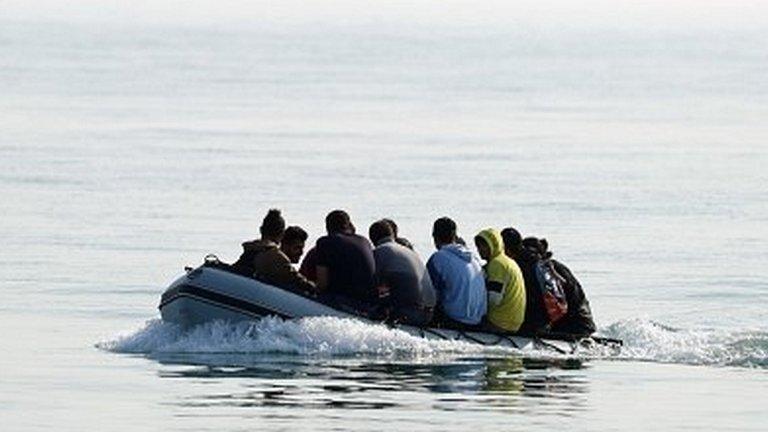Asylum seekers: UK considered floating barriers in Channel
- Published

The government looked into putting floating barriers in the English Channel to stop asylum seekers crossing to the UK, a leaked document shows.
The Βι¶ΉΤΌΕΔ Office approached the trade group Maritime UK over the possible use of temporary "marine fencing", in a request for ideas sent over the summer.
This, it said, must be able to "prevent a slow-moving, heavily overloaded migrant boat from making progress".
The government said it did not "comment on leaks".
But Maritime UK said it was its "clear view" that building a wall in the Channel was "not legally possible" under the terms of the
This year, almost 7,000 people have reached the UK in more than 500 small boats, often totally unsuited to the conditions.
Βι¶ΉΤΌΕΔ Secretary Priti Patel has declared she is "determined to stop this criminal trade".
The government has looked at setting up a processing centre for asylum seekers on Ascension Island, 4,000 miles from the UK - or on disused ferries moored off the coast of England.
Meanwhile, that other proposals drawn up by the Βι¶ΉΤΌΕΔ Office include the use of a water cannon in the Channel to create waves to push back vessels.
'Innovation'
On Thursday, the most senior civil servant at the Βι¶ΉΤΌΕΔ Office, Matthew Rycroft, told MPs that "everything is on the table" when it comes to "improving" the UK's asylum system.
He added that the UK had been "looking at what a whole host of other countries do in order to bring innovation into our own system".
An email from Maritime UK - sent on 17 September and - included the request put out by the government over the summer, asking "what options are available for marine fencing and other water-based technologies that would inhibit passage to UK territorial waters".
These needed "the capability to fully prevent a slow-moving, heavily overloaded migrant boat from making progress" and had to be "deployable to a precise location, and capable of remaining in that position".
The request added that the technology had to be "rapidly deployable and rapidly removable", while being "safe for those who come into contact with it" and "for those operating it".
The Strait of Dover - separating the Channel and the North Sea - is the
The Βι¶ΉΤΌΕΔ Office suggested that any fencing be placed "on the median line", which separates French and UK territorial waters, but "without the equipment entering French waters".
It was reported earlier this year that the Greek government was planning to to deter people crossing the Aegean by boat from Turkey.
These would use pylons connected to the seabed, leaving half a metre - topped by flashing lights - above the surface, the magazine Dezeen said.
'Ruthless criminals'
Labour leader Sir Keir Starmer has described some of the ideas being considered by the Βι¶ΉΤΌΕΔ Office as "inhuman" and "ridiculous".
When asked about the possibility of a floating wall in the Channel, a Βι¶ΉΤΌΕΔ Office spokeswoman said the department "does not comment on leaks".
They also said: "As the public will fully understand, we do not comment on operational matters because to do so could provide an advantage to the exploitative and ruthless criminals who facilitate these dangerous crossings, as they look for new ways to beat the system."
Ben Murray, director of Maritime UK, said: "As the umbrella organisation for UK maritime we are a conduit between industry and government and are often asked by government for advice or input on policy matters.
"The Βι¶ΉΤΌΕΔ Office engaged us to pass on a question around options to inhibit passage to UK territorial waters, which we gave to our members.
"The clear view, which we shared with the Βι¶ΉΤΌΕΔ Office, was that as a matter of international convention, that this is not legally possible."